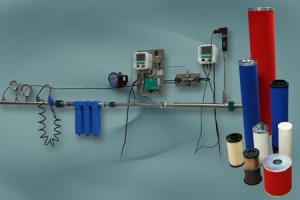FILTER ELEMENTS TESTED TO ENSURE AIR QUALITY
As a key supplier of compressed-air filter elements to the UK market, Hi-line Industries Ltd undertake full test and air quality analysis of the filter media that they supply. Now, however, this valuable service is also available to cover the testing of any filtration media products, including competitors equipment. The choice of the correct filter element has a direct effect on operational costs, and experience shows that the air quality can help minimise or even eliminate unnecessary costs.
 Following investments in state-of-the-art testing equipment including particle counters, flow meters, mass flow controllers and dewpoint meters, Hi-line provide a test facility to measure the efficiency of filter elements. Tests indicate compliance with ISO 8573-1:2010, being the international standard for compressed air quality. This standard lays down minimum air quality standards and defines allowable content levels for dirt, water and oil.
Following investments in state-of-the-art testing equipment including particle counters, flow meters, mass flow controllers and dewpoint meters, Hi-line provide a test facility to measure the efficiency of filter elements. Tests indicate compliance with ISO 8573-1:2010, being the international standard for compressed air quality. This standard lays down minimum air quality standards and defines allowable content levels for dirt, water and oil.
During the compression cycle, any inherent air particulates (dust, pollen, water etc) are drawn into the compressor and entrained into the compressed air stream which typically can be at seven times normal atmospheric conditions. Added to this stream is the carbon, oil and metallic debris from the compression process, generating a potentially toxic and destructive cocktail within the compressed air stream. Even for general factory applications, such contaminated air supplies are not acceptable. Where the compressed air supplies are for food contact, dental or breathing air requirements, then stricter quality regulations come into force for these applications.
As a major contaminant of compressed air systems, oil aerosols (minute droplets of oil suspended in the air stream) can be partially removed by coalescing filters in condensate form. Heavier oil contaminates appears as wall flow, with the liquid oil creeping along the inner surface of the air pipeline. Vapours or oil mist in a cloud form are not removed by coalescing filters. Micro organisms which can also proliferate in a compressed air system can be inhibited by maintaining a pressure dewpoint of better than -26°C.
To avoid unnecessary damage of equipment or contamination in downstream process lines, it is recommended that adequate testing of all filter media should be undertaken. For further information on breathing air, dental air, BRC and BCAS food grade air quality standards both contact and non-contact air, filter testing and general air analysis contact Hi-line Industries Ltd.
Further information is available from:
Hi-line Industries Ltd
5 Crown Industrial Estate
Oxford Street
Burton on Trent
Staffordshire
DE14 3PG
Tel: 01283 533377
Fax: 01283 533367

































